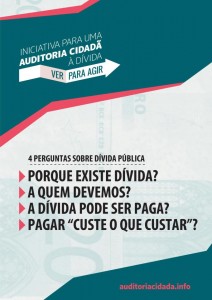This post is part of our special coverage Europe in Crisis
Ever since Portugal's previous government and the troika (EU, ECB and IMF) signed the “memorandum of understanding,” in May 2011, the country social problems have intensified: rights of workers have been withdrawn, wages have decreased and budget cuts to social assistance or public health programs have essentially defaced the welfare state.
The austerity measures defined in the agreement and put in to practice by the current government – a coalition between right wing liberals and conservatives – not only leaves deep scars of social regression but also leaves people unable to shake off the economic crisis. The recession of the Portuguese economy (a decline of 3.3% is expected this year, a figure that only Greece in the European economic space shares), or the rampant unemployment of the last few months (official numbers from March show that the unemployment rate has surpassed 15%, reaching 35% in youth), are facts which discredit the solutions recommended by the drastic austerity measures that plague European countries.

Until debt tear us apart. Urban art by maismenos.net in Lisbon. Photo by Miguel Manso (used with permission)
In response to the IMF “bailout,” the central issue that has been raised by those critical of neoliberal policies, is public debt: its contestation, legitimacy and legality. Moreover, questions have been raised on the political and social implications of allocating the responsibility of paying a debt which resulted from the decisions of the governing elite and their financial interests to all citizens.
The “large nebula” of the audit
In the summer of 2011, a group started preparing a citizen audit for the Portuguese public debt. The Iniciativa por uma Auditoria Cidadã (IAC, Initiative for a Citizen Audit) [pt] brought together economists, former journalists, unionists, politicians and left wing researchers, and was propelled by M12M (March 12 Movement) [pt], an activist platform born out of the mobilization for the protest of the Scraping-by Generation. IAC was publicly launched on November 15, with the task of independently evaluating public accounts – the kind of campaign that has been spreading all around Europe.

Poster from the Iniciativa por Uma Auditoria Cidadã à Dívida Pública shared on Facebook (public domain)
However, the technical issues that the public debt as well as the “bailout” itself raise, may lead the common citizen under a “large nebula,” quoting the expression used by someone who intervened in a public session of IAC in June, 2012, in Coimbra. Luís Fernandes from the blog Questões Nacionais (National Issues) reported [pt] on the session, highlighting a question raised by one participant who addressed the panelists: “Do you have numbers?” The answer came from the researcher and economist José Castro Caldas:
Sabemos que, pelos dados disponíveis, a dívida andará pelos 200 mil milhões. Ou seja, cerca de 110 por cento do PIB. Depois existe a dívida privada. Esta, foram os bancos que a contraíram. Os países da UE fizeram um pacto de sangue para que nenhum banco vá à falência. Em Portugal, tivemos de assumir a dívida de um pequeno banco [BPN, Banco Português de Negócios, nacionalizado em Novembro de 2008 e vendido ao BIC em Julho de 2011]; outro [BCP, Banco Comercial Português], como era demasiado grande, não deixaram.
Going against the temptation of falling into the technical perspective that makes one lose sight of the eminently political matter of the debt, the “bailout” and the mass imposition of an European program of austerity in the long term, Rui Viana Pereira from the blog CADPP calls attention to the real issues while criticizing IAC itself:
Os documentos de trabalho e as intervenções nas reuniões revelaram objectivamente que as pessoas mais influentes no estabelecimento duma linha de pensamento e acção não tinham (e creio que ainda hoje continuam a não ter) uma noção aproximada do que seja uma auditoria cidadã, confundindo-a com um processo de auditoria técnica, contabilística, economicista, levada a cabo por técnicos, apenas diferindo duma empresa de auditoria técnica pelo facto de não serem principescamente pagos e não terem um cartão de livre acesso aos documentos do Estado.
According to the blogger and former member of IAC, the initiative is oriented by the goal of seeking to restructure the debt, while refusing to either totally or partially suspend it. However, this thesis was unequivocally stressed by Éric Toussaint [pt], president of the Committee for the Nullification of the Third World Debt. To get out of the debt, “it is necessary to ‘break with the troika’ and make it ‘renegotiate the debt.'” Although the Belgian political scientist and university professor had participated in the preparatory works of the IAC, it was found that this course of action did not work.

Graffiti in a street of Lisbon “Escape from the system” – the caption reads “Man looking for money for the ticket”. Photo by Trois Têtes (TT) on Flickr (CC BY-NC 2.0)
A more sustained critical vision [pt] about the auditing process has been developed by the economist Vítor Lima, on the blog Grazia Tanta [pt]. Comparing the cases of Ecuador [pt], Iceland and Greece, he argues:
sem um movimento social que alicerce a recusa do pagamento da dívida como base para a sua contestação em termos técnicos, das partes válidas e das vigarices, qualquer auditoria será feita nos termos e com as conclusões que o corrupto poder político em Portugal entender.
The pessimism of several bloggers [pt] concerning the methods adopted for the citizen audit harden the problem of how to deal with a collectivized public debt whose consequences reach more recently the middle class, but especially the underprivileged classes.
Meanwhile at the end of March, the Ministry of Finance announced that the consulting firm Ernst & Young had been chosen to audit the public-private partnerships (PPP) foreseen by the financial assistance program signed with the troika. In May, IAC asked the Attorney General's Office to cancel [pt] the contract with the company, considering that there is a “flagrant conflict of interests”, as records show that Ernst & Young provides services to companies which are involved in several PPP to be audited.
Although the audit is just staring, Rui Viana's statement on Cadpp seems to be set in stone [pt]:
Continua a ser um mistério absoluto para as pessoas interessadas na questão, para a comunicação social e para a sociedade em geral, e até para a generalidade dos participantes e subscritores da iniciativa, o que estará a passar-se dentro da comissão de auditoria cidadã, o que estará ela a fazer à porta fechada, ou mesmo se alguma coisa se passará; ou se terá sido morta e enterrada sem declaração pública de óbito.
This post is part of our special coverage Europe in Crisis







3 comments
This document is unintelligible. Probably a direct translation from super formal Portuguese, so characteristic of the Portuguese way of conducting affairs.